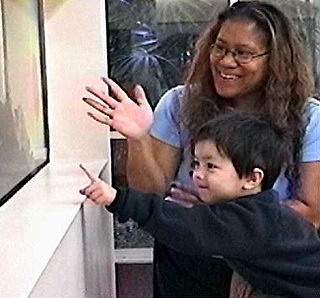Related Research Articles
Developmental disorders comprise a group of psychiatric conditions originating in childhood that involve serious impairment in different areas. There are several ways of using this term. The most narrow concept is used in the category "Specific Disorders of Psychological Development" in the ICD-10. These disorders comprise developmental language disorder, learning disorders, developmental coordination disorders, and autism spectrum disorders (ASD). In broader definitions, attention deficit hyperactivity disorder (ADHD) is included, and the term used is neurodevelopmental disorders. Yet others include antisocial behavior and schizophrenia that begins in childhood and continues through life. However, these two latter conditions are not as stable as the other developmental disorders, and there is not the same evidence of a shared genetic liability.
Ole Ivar Løvaas was a Norwegian-American clinical psychologist and professor at the University of California, Los Angeles. He is most well known for his research on what is now called applied behavior analysis (ABA) to teach autistic children through prompts, modeling, and positive reinforcement. The therapy is also noted for its use of aversives (punishment) to reduce undesired behavior.
Discrete trial training (DTT) is a technique used by practitioners of applied behavior analysis (ABA) that was developed by Ivar Lovaas at the University of California, Los Angeles (UCLA). DTT uses mass instruction and reinforcers that create clear contingencies to shape new skills. Often employed as an early intensive behavioral intervention (EIBI) for up to 25–40 hours per week for children with autism, the technique relies on the use of prompts, modeling, and positive reinforcement strategies to facilitate the child's learning. It previously used aversives to punish unwanted behaviors. DTT has also been referred to as the "Lovaas/UCLA model", "rapid motor imitation antecedent", "listener responding", errorless learning", and "mass trials".
Applied behavior analysis (ABA), also called behavioral engineering, is a psychological intervention that applies approaches based upon the principles of respondent and operant conditioning to change behavior of social significance. It is the applied form of behavior analysis; the other two forms are radical behaviorism and the experimental analysis of behavior.
High-functioning autism (HFA) was historically an autism classification where a person exhibits no intellectual disability, but may experience difficulty in communication, emotion recognition, expression, and social interaction.
The Association for Behavior Analysis International (ABAI) is a nonprofit organization dedicated to promoting behavior analysis. The organization has over 9,000 members. The group organizes conferences and publishes journals on the topic of applied behavior analysis (ABA). ABAI has issued detailed, specific position papers intended to guide practitioners of ABA. The ABAI publishes six scholarly journals including The Psychological Record and their primary organ, Perspectives on Behavior Science, formerly The Behavior Analyst. They also publish an informational journal, Education and Treatment of Children, describing practical treatment of children with behavioral problems.

The University of North Carolina TEACCH Autism Program creates and disseminates community-based services, training programs, and research for individuals of all ages and skill levels with autism spectrum disorder (ASD), to enhance the quality of life for them and their families across the lifespan.

Autism therapies include a wide variety of therapies that help people with autism, or their families. Such methods of therapy seek to aid autistic people in dealing with difficulties and increase their functional independence.
Pivotal response treatment (PRT), also referred to as pivotal response training, is a naturalistic form of applied behavior analysis used as an early intervention for children with autism that was pioneered by Robert Koegel and Lynn Kern Koegel. PRT advocates contend that behavior hinges on "pivotal" behavioral skills—motivation and the ability to respond to multiple cues—and that development of these skills will result in collateral behavioral improvements. In 2005, Richard Simpson of the University of Kansas identified pivotal response treatment as one of the four scientifically based treatments for autism.
The professional practice of behavior analysis is a domain of behavior analysis, the others being radical behaviorism, experimental analysis of behavior and applied behavior analysis. The practice of behavior analysis is the delivery of interventions to consumers that are guided by the principles of radical behaviorism and the research of both experimental and applied behavior analysis. Professional practice seeks to change specific behavior through the implementation of these principles. In many states, practicing behavior analysts hold a license, certificate, or registration. In other states, there are no laws governing their practice and, as such, the practice may be prohibited as falling under the practice definition of other mental health professionals. This is rapidly changing as behavior analysts are becoming more and more common.

Video modeling (VM) is a mode of teaching that uses video recording and display equipment to provide a visual model of the targeted behaviors or skill. In video self-modeling (VSM), individuals observe themselves performing a behavior successfully on video, and then imitate the targeted behavior. Video modeling has been used to teach many skills, including social skills, communication, and athletic performance; it has shown promise as an intervention for children with autism spectrum disorders (ASD). Important practical and theoretical questions remain largely unanswered about video modeling and other forms of video-based intervention. Video modeling has theoretical roots in the social learning theory work of Bandura (1969), which called attention to the ability to learn through observation.

Paul Wehman is a professor of counseling and special education at the School of Education, Virginia Commonwealth University. He also is Director of the Rehabilitation Research and Training Center.
Edward Gary Carr was an internationally recognized pioneer in autism treatment research. He applied studies about the functions that self-injurious behaviors served and contributed substantially to the development and refinement of positive behavior support. In addition, he assessed the benefits of teaching sign language to children with expressive and receptive language disorders as seen in children with autism. He was the Director of the Research & Training Center on Positive Behavior Support for Autism & Developmental Disabilities at Stony Brook University.
Autism, also called autism spectrum disorder (ASD) or autism spectrum condition (ASC), is a neurodevelopmental disorder marked by deficits in reciprocal social communication and the presence of restricted and repetitive patterns of behavior. Other common signs include difficulty with social interaction, verbal and nonverbal communication, along with perseverative interests, stereotypic body movements, rigid routines, and hyper- or hyporeactivity to sensory input. Autism is clinically regarded as a spectrum disorder, meaning that it can manifest very differently in each person. For example, some are nonspeaking, while others have proficient spoken language. Because of this, there is wide variation in the support needs of people across the autism spectrum.
The Association for Science in Autism Treatment (ASAT) is a non-profit organization devoted to autism. It was founded in 1998 and is currently based in Hoboken, New Jersey. Members of its advisory board include Eric Fombonne and Stephen Barrett, Tristam Smith was one of its board members until his death in August 2018. A report by the Association for Behavior Analysis International mentioned ASAT's website as a useful resource for parents of children with autism, as does the website of the University of North Texas and that of the University of Michigan Health System.
The history of autism spans over a century; autism has been subject to varying treatments, being pathologized or being viewed as a beneficial part of human neurodiversity. The understanding of autism has been shaped by cultural, scientific, and societal factors, and its perception and treatment change over time as scientific understanding of autism develops.
Alpine Learning Group is a state funding approved private special education school in Paramus, New Jersey, United States. Established in 1988, the school serves students aged 3 to 21 with autism spectrum disorder, and it is known to be a prestigious educational and research facility utilizing applied behavior analysis (ABA) services.

The New England Center for Children (NECC) is an independently-operated, private special education residential school in Southborough, Massachusetts, United States. Established in 1975, NECC provides intensive applied behavior analysis interventions for students with autism spectrum disorder between the ages of 3 and 22 years old.
Beth Sulzer-Azaroff was a psychologist and pioneering figure in the field of behavior analysis. She conducted research on organizational behavior management and promoted the use of applied behavior analysis for teaching children with autism. The Federation of Associations in Behavioral & Brain Sciences noted her contributions as "instrumental in translating findings from the basic behavior analytic laboratory to the applied setting, from the classroom to the factory."
Bridget A. Taylor is an American psychologist and behavior analyst, specializing in autism. She is the co-founder and CEO of Alpine Learning Group, a private school for children and adults with autism. Taylor is recognized for her research on children with autism in an applied practice setting, which has led to the development of research programs in other applied settings.